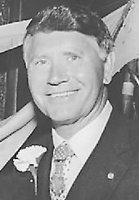|
| Affiliation | Republican |

|
| |
1967-04-00 |
-> |
|
| Name | Leo K. Thorsness |
| Address |
Renton, Washington , United States |
| Email | None |
| Website | None |
| Born |
February 14, 1932
|
| Died | May 02, 2017
(85 years)
|
| Contributor | eddy 9_99 |
| Last Modifed | Magical Horse
May 03, 2017 02:47pm |
| Tags |
Air Force -
|
| Info | Colonel Leo K. Thorsness
Leo Thorsness earned the Medal of Honor for one of the epic solo battles of the Vietnam War, but didn't know Congress had awarded it to him until years later. The award wasn't announced publicly; as Thorsness was a prisoner of war.
He was born in February 1932 in Walnut Grove, Minn. Thorsness enlisted in the Air Force in 1951 and earned his commission three years later through the Aviation Cadet Program. His first operational flying was in F-84 Thunderstreaks with the 31st Strategic Fighter Wing in Albany, Ga. He later flew the F-100 Super Sabre before transitioning to the F-105 Thunderchief.
By 1966, the air war in Southeast Asia had taken on new dimensions as the Soviet Union supplied the North Vietnamese with surface-to-air missiles. The Air Force countered the buildup of SAMs with the "Wild Weasels," aircrews flying F-105s. The Weasel's job was to precede a strike force into a target area, entice enemy SAMs and antiaircraft radars to come on the air, and knock them out with bombs or missiles that homed on the radar's emissions. In other words, they offered themselves as targets for enemy gunners so they could locate them and take them out. The presence of MiG fighters made the job even more harrowing.
Thorsness, then a major, was "Head Weasel" of the 357th Tactical Fighter Squadron at Takhli Air Base in Thailand. On April 19, 1967, he and his backseater, Capt. Harold Johnson, fought a wild 50-minute duel with SAMs, antiaircraft guns and MiGs. They set out in a formation of four planes. Their target was an army compound near Hanoi, heavily defended. Thorsness directed two of the F-105s north and he and his wingman stayed south, forcing enemy gunners to divide their attention. After initial success at destroying two SAM sites, things turned for the worst. First, Thorsness' wingman was hit by flak. He and his backseater ejected. Then the two Weasels he had sent north were attacked by MiGs. The afterburner of one of the F-105s wouldn't light, so he and his wingman were forced to return to Takhli, leaving Thorsness alone to fight solo.
As the F-105 circled the parachutes, relaying their position to the Search and Rescue Center, Johnson spotted a MiG off their left wing. The F-105, though not designed for air-to-air combat, responded well as Thorsness attacked the MIG and destroyed it with a 20-mm cannon, just as another MiG closed on his tail. Low on fuel, Thorsness broke off the battle and rendezvoused with a tanker.
In the meantime, two A-1E Sandys and a rescue helicopter arrived to look for the crewmen. Upon being advised of that fact, Thorsness, with only 500 rounds of ammunition left, turned back from the tanker to fly cover for the rescue force, knowing there were at least five MiGs in the area. As he approached the area, he spotted four MiG-17 aircraft and initiated an attack on them, damaging one and driving the others away from the rescue scene. His ammunition gone, he returned to the rescue scene, hoping to draw the MiGs away from the remaining A-1E. It could very well have been a suicidal mission, but just as he arrived, so did a U.S. strike force and hit the enemy fighters.
But Thorsness' day wasn't over yet. Again low on fuel, he headed for a tanker just as one of the strike force pilots, almost out of fuel himself, radioed him for help. Thorsness knew he couldn't make Takhli without refueling, but he quickly determined he could make it to Udorn, 200 miles closer, so he directed the tanker toward the strike fighter. Once across the Mekong Delta, he throttled back to idle and "glided" toward Udorn, touching down as his tanks went dry.
Eleven days later, on his 93rd mission, just three short of returning home, Thorsness and Johnson were shot down by a MiG. Both men ejected at high speed, Thorsness suffering severe injuries. Both men were captured and spent the next six years in North Vietnam prisons. Because of his "uncooperative attitude," Thorsness was denied medial attention, spent a year in solitary and suffered severe back injuries under torture.
On March 4, 1973, both men were released from prison, Thorsness on crutches. President Nixon presented the Medal of Honor on Oct. 15, 1973, to Thorsness for his heroism on that busy April day in 1967. Johnson was later awarded the Air Force Cross. The MOH had actually been awarded by Congress while Thorsness was still a POW. To keep the Vietnamese from using the information against him, it wasn't announced publicly until he returned home.
Thorsness completed 23 years in the Air Force and retired in 1973 as a colonel. He later served as a Washington State Senator.
[Link] |
 | BOOKS |
 |
|
| Title |
Purchase |
Contributor |
|
| Start Date |
End Date |
Type |
Title |
Contributor |
|
| Date |
Category |
Headline |
Article |
Contributor |
|
 | INFORMATION LINKS |
|
|
|

